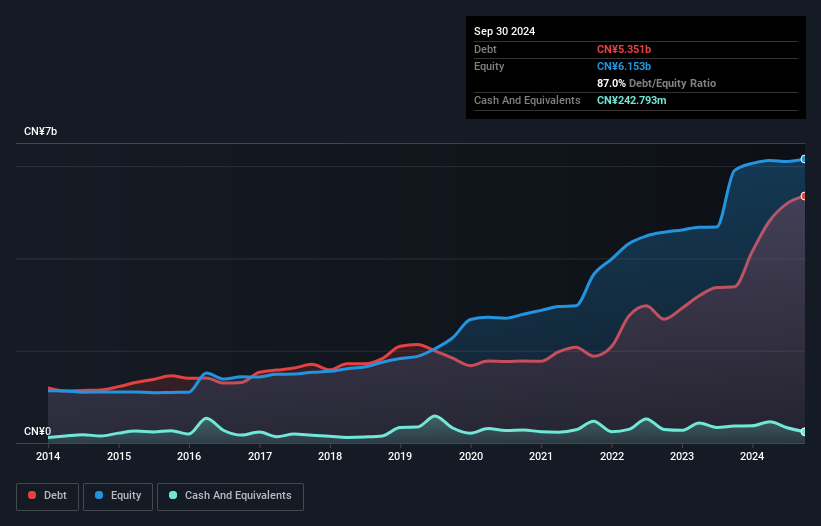- China
- /
- Metals and Mining
- /
- SZSE:002182
Baowu Magnesium Technology (SZSE:002182) Takes On Some Risk With Its Use Of Debt

Legendary fund manager Li Lu (who Charlie Munger backed) once said, 'The biggest investment risk is not the volatility of prices, but whether you will suffer a permanent loss of capital.' When we think about how risky a company is, we always like to look at its use of debt, since debt overload can lead to ruin. As with many other companies Baowu Magnesium Technology Co., Ltd. (SZSE:002182) makes use of debt. But should shareholders be worried about its use of debt?
When Is Debt Dangerous?
Debt assists a business until the business has trouble paying it off, either with new capital or with free cash flow. In the worst case scenario, a company can go bankrupt if it cannot pay its creditors. While that is not too common, we often do see indebted companies permanently diluting shareholders because lenders force them to raise capital at a distressed price. Of course, plenty of companies use debt to fund growth, without any negative consequences. The first thing to do when considering how much debt a business uses is to look at its cash and debt together.
View our latest analysis for Baowu Magnesium Technology
How Much Debt Does Baowu Magnesium Technology Carry?
You can click the graphic below for the historical numbers, but it shows that as of September 2024 Baowu Magnesium Technology had CN¥5.35b of debt, an increase on CN¥3.38b, over one year. On the flip side, it has CN¥242.8m in cash leading to net debt of about CN¥5.11b.

A Look At Baowu Magnesium Technology's Liabilities
Zooming in on the latest balance sheet data, we can see that Baowu Magnesium Technology had liabilities of CN¥4.26b due within 12 months and liabilities of CN¥2.25b due beyond that. Offsetting this, it had CN¥242.8m in cash and CN¥2.33b in receivables that were due within 12 months. So its liabilities total CN¥3.94b more than the combination of its cash and short-term receivables.
While this might seem like a lot, it is not so bad since Baowu Magnesium Technology has a market capitalization of CN¥12.0b, and so it could probably strengthen its balance sheet by raising capital if it needed to. But we definitely want to keep our eyes open to indications that its debt is bringing too much risk.
We measure a company's debt load relative to its earnings power by looking at its net debt divided by its earnings before interest, tax, depreciation, and amortization (EBITDA) and by calculating how easily its earnings before interest and tax (EBIT) cover its interest expense (interest cover). The advantage of this approach is that we take into account both the absolute quantum of debt (with net debt to EBITDA) and the actual interest expenses associated with that debt (with its interest cover ratio).
Baowu Magnesium Technology has a rather high debt to EBITDA ratio of 7.5 which suggests a meaningful debt load. However, its interest coverage of 3.4 is reasonably strong, which is a good sign. The good news is that Baowu Magnesium Technology improved its EBIT by 9.6% over the last twelve months, thus gradually reducing its debt levels relative to its earnings. There's no doubt that we learn most about debt from the balance sheet. But it is future earnings, more than anything, that will determine Baowu Magnesium Technology's ability to maintain a healthy balance sheet going forward. So if you're focused on the future you can check out this free report showing analyst profit forecasts.
Finally, a business needs free cash flow to pay off debt; accounting profits just don't cut it. So the logical step is to look at the proportion of that EBIT that is matched by actual free cash flow. During the last three years, Baowu Magnesium Technology burned a lot of cash. While investors are no doubt expecting a reversal of that situation in due course, it clearly does mean its use of debt is more risky.
Our View
On the face of it, Baowu Magnesium Technology's net debt to EBITDA left us tentative about the stock, and its conversion of EBIT to free cash flow was no more enticing than the one empty restaurant on the busiest night of the year. But at least it's pretty decent at growing its EBIT; that's encouraging. Once we consider all the factors above, together, it seems to us that Baowu Magnesium Technology's debt is making it a bit risky. Some people like that sort of risk, but we're mindful of the potential pitfalls, so we'd probably prefer it carry less debt. The balance sheet is clearly the area to focus on when you are analysing debt. But ultimately, every company can contain risks that exist outside of the balance sheet. Case in point: We've spotted 3 warning signs for Baowu Magnesium Technology you should be aware of, and 2 of them don't sit too well with us.
At the end of the day, it's often better to focus on companies that are free from net debt. You can access our special list of such companies (all with a track record of profit growth). It's free.
Valuation is complex, but we're here to simplify it.
Discover if Baowu Magnesium Technology might be undervalued or overvalued with our detailed analysis, featuring fair value estimates, potential risks, dividends, insider trades, and its financial condition.
Access Free AnalysisHave feedback on this article? Concerned about the content? Get in touch with us directly. Alternatively, email editorial-team (at) simplywallst.com.
This article by Simply Wall St is general in nature. We provide commentary based on historical data and analyst forecasts only using an unbiased methodology and our articles are not intended to be financial advice. It does not constitute a recommendation to buy or sell any stock, and does not take account of your objectives, or your financial situation. We aim to bring you long-term focused analysis driven by fundamental data. Note that our analysis may not factor in the latest price-sensitive company announcements or qualitative material. Simply Wall St has no position in any stocks mentioned.
About SZSE:002182
Baowu Magnesium Technology
Engages in mining and non-ferrous metal smelting, and processing in China and internationally.
High growth potential with mediocre balance sheet.

